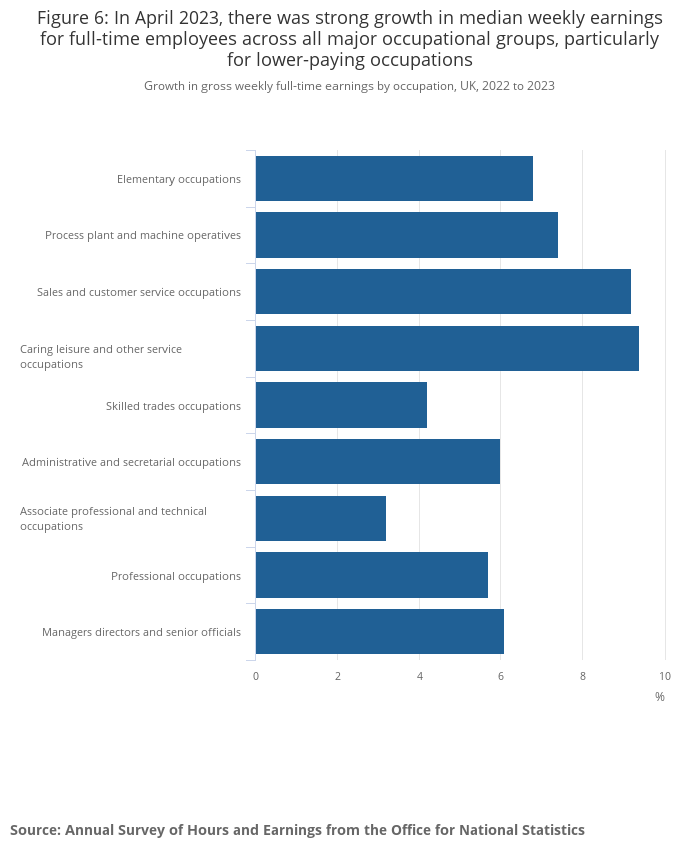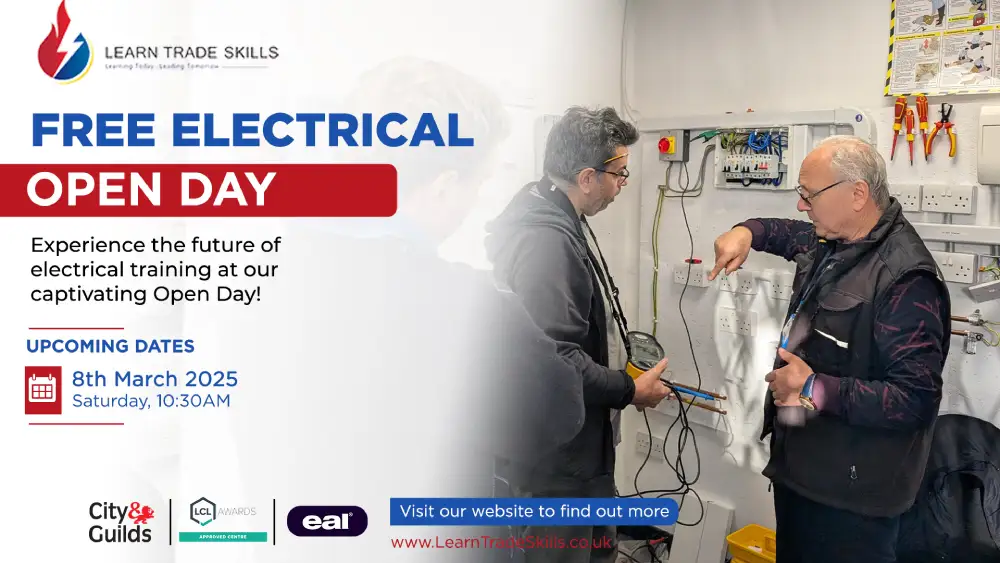

Thriving Demand for Expertise
In the rapidly evolving job landscape of the UK, the need for skilled electricians has surged to unprecedented levels. Recent data from the Office for National Statistics (ONS) highlights a substantial increase in job vacancies within skilled trades, particularly in the electrical sector. This surge underscores the pressing requirement for qualified professionals to meet the evolving demands of industries across the country. The latest information unveiled by the Office for National Statistics (ONS) on November 2023 also affirms that electricians remain among the top earners in skilled professions, boasting an average salary of £35,494.00.

Completing our electrical training courses not only means gaining technical proficiency but also opens doors to a wide range of industries.
This non-exhaustive list showcases just a few sectors that eagerly welcome skilled electrical experts:
Construction and Building Services
New Construction: Electricians play a crucial role in new construction projects by installing wiring systems, electrical panels, outlets, and lighting. They work closely with other construction professionals to ensure the electrical components align with the overall building design and safety standards.
Renovations and Upgrades: In existing structures, electricians contribute to renovations and upgrades. This may involve rewiring, updating electrical systems to meet current codes, and integrating new technologies to enhance energy efficiency and functionality.
Renewable Energy:
Solar Energy: Electricians in the renewable energy sector work on solar panel installations for residential, commercial, and industrial properties. They ensure the proper connection of solar arrays to electrical systems, maximizing energy capture and distribution.
Check out our solar panel installation course on the following link:
Wind Energy: Electricians contribute to the installation and maintenance of wind turbines, connecting them to the electrical grid and ensuring their optimal performance. This involves working with complex electrical systems associated with wind power generation. Check our out renewal energy package course on this link
Check out our renewable energy package course on the following link:
Technology and Automation:
Smart Homes: Electricians are instrumental in the installation of smart home systems, including automated lighting, security systems, and integrated IoT devices. They ensure seamless communication between various components, contributing to the creation of modern, technologically advanced living spaces.
Industrial Automation: In industries, electricians work on implementing and maintaining automated systems that control manufacturing processes. This involves troubleshooting, repairing, and optimizing electrical components to enhance efficiency and productivity.
Manufacturing:
Production Line Support: Electricians in manufacturing plants keep production lines running smoothly by maintaining and repairing electrical machinery. They may also be involved in upgrading equipment to meet energy efficiency standards and integrating new technologies for improved manufacturing processes.
Healthcare:
Medical Facilities: Electricians play a critical role in healthcare settings by ensuring the electrical infrastructure supports the operation of medical equipment. They are involved in power distribution, backup systems, and maintaining a safe electrical environment for patient care and medical research.
Transportation:
Electrified Public Transport: Electricians contribute to the electrification of public transport, such as electric trains and buses. They install and maintain the electrical systems that power these modes of transportation, supporting the transition towards sustainable and eco-friendly mobility.
Electric Vehicles (EVs): With the growing popularity of electric vehicles, electricians are needed to install and maintain charging stations, ensuring a reliable and efficient infrastructure for EV users
Check out our electrical vehicle charing course on the following link:
Network Maintenance: Electricians in the telecommunications sector focus on maintaining and upgrading the electrical components of communication networks. This includes ensuring the reliability of power supply to cell towers, data centers, and other critical infrastructure.
Cutting-edge Technologies: As telecommunications technologies evolve, electricians play a pivotal role in implementing and integrating cutting-edge technologies such as 5G, fiber optics, and advanced networking systems.
Please note that this list is non-exhaustive, and opportunities for skilled electricians extend far beyond these examples.
Why Choose Learn Trade Skills?
At Learn Trade Skills, our commitment goes beyond conventional training. Our state-of-the-art facility offers hands-on, practical experiences that mirror real-world scenarios. Our industry-relevant curriculum, coupled with expert instructors, ensures that our students are not just keeping pace but staying ahead in this dynamic field. We keep our classes to a limited capacity ensuring that we never compromise on the quality of our teaching. We will guide you every step of the way, not to mention our continued employment support until you find your first job!
Sign up for our electrical training courses on the below link and discover the diverse industries waiting for your expertise.
Your future awaits—power it up with Learn Trade Skills!
Sezai Aramaz is the esteemed founder of Learn Trade Skills, boasting over 40 years of experience in the electrical industry in the UK. With two decades dedicated to educating future electricians, he served as an Electrical Installation Lecturer and Assessor. Aramaz's expertise and commitment have contributed significantly to the growth and proficiency of aspiring tradespeople in the field.



© Copyright Learn Trade Skills 2025
“Lorem ipsum dolor sit amet, consectetur adipiscing elit. Ut pretium tristique purus nec consectetur. Nulla feugiat eget tellus aliquam scelerisque. Sed eget luctus enim, sed mattis enim. Lorem ipsum dolor sit amet, consectetur adipiscing elit. Ut pretium tristique purus nec consectetur. Nulla feugiat eget tellus aliquam scelerisque. Sed eget luctus enim, sed mattis enim.Nulla feugiat eget tellus aliquam scelerisque. Sed eget luctus enim, sed mattis enim. Lorem ipsum dolor sit amet, consectetur adipiscing elit. Ut pretium tristique purus nec consectetur. Nulla feugiat eget tellus aliquam scelerisque. Sed eget luctus enim, sed mattis enim.”
William Goss
Electrician course
11/11/2024